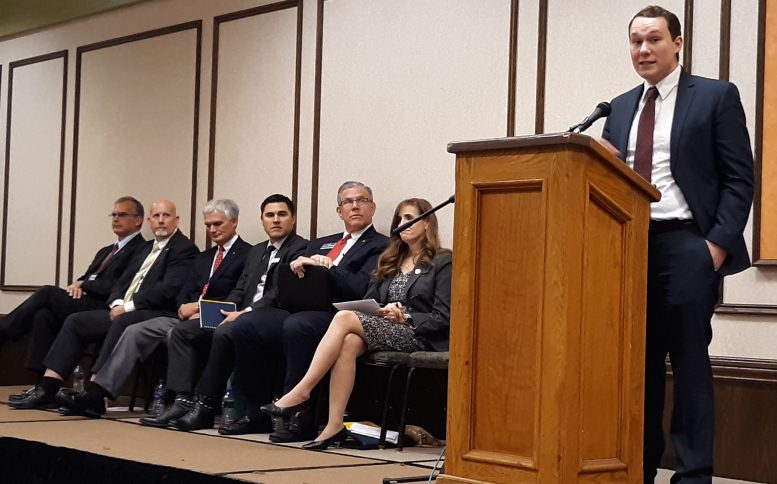By JAN LARSON McLAUGHLIN
BG Independent News
For two hours Sunday afternoon, 18 candidates on the November ballot talked about the lack of civility in Congress, arming teachers in schools, abortion, and judicial temperament.
As far as candidate forums go, this one was not a snoozer. However, it was rather lengthy, so another story will follow about the seven State Board of Education candidates.
The forum, hosted by both the Bowling Green and Perrysburg League of Women Voters groups, skipped the candidates’ opening statements and went straight into questions.
The three candidates for the 5th District Congress seat were Democrat J. Michael Galbraith, who has taught finance and management at the college level; Libertarian Don Kissick, who is an autoworker and Navy veteran; and incumbent Republican Bob Latta, who previously served as state legislator and county commissioner.
The first question was about the brutal discourse in Congress, and how that might be changed.
Latta talked about the importance of establishing working relationships with people. “You just have to turn off the TV and sit back and talk,” he said. Latta was critical of the Democrats being unwilling to consider the nomination of Brett Kavanaugh to the U.S. Supreme Court, and instead stating from the beginning that they would oppose his advancement to the court.
Galbraith saw the issue differently.
“Congress is being run by a group of people with extremely narrow interests,” he said, noting tribalism on both sides.
As for Kavanaugh, Galbraith said the nominee was “forced through.”
“I personally didn’t feel this man has the temperament,” he said. Galbraith pointed out the partisanship that doomed Merrick Garland’s nomination to the Supreme Court.
“They are simply not responsible to the people of the U.S.,” Galbraith said of Congress.
Kissick suggested that more could be accomplished if Congress would stick to the issues rather than attacking each other. “We’ve lost that in Washington, D.C.,” he said.
Career politicians are disconnected from the average person. He suggested citizens could change that situation by voting outside the two-party system.
“You have to start voting differently,” Kissick said. “That’s how we ended up in this mess.”
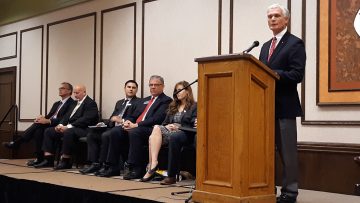
Congressman Bob Latta speaks at forum.
The congressional candidates were then asked about the contamination at the Luckey FUSRAP site and the harmful algae in Lake Erie. When would the studying end and the solutions begin?
Galbraith said there is “too much finger pointing going on.”
Farmers and people working on the environment and clean water issues need to “sit down together” to solve problems. “Farmers are interested in finding a solution” he said.
“Water is a crucial resource and things are not getting better,” he said, adding that more regulations may be necessary.
As a Libertarian, Kissick does not see a solution coming from government. “I’m a staunch free market advocate,” he said.
Government solutions benefit politicians and their donors, Kissick said. The problem is best suited for the courts to handle, he added.
“There needs to be a shake up,” he said. Congress has been “doing nothing or dragging its feet for years.”
“I’m just not a fan of the federal government sticking its nose everywhere,” Kissick said. Once that starts, “they don’t like to leave.”
Latta said the cleanup at the Luckey facility is the largest project in the Army Corps of Engineer’s Buffalo District.
Latta also mentioned the Lake Erie restorative efforts and his introduction of the Drinking Water Protection Act.
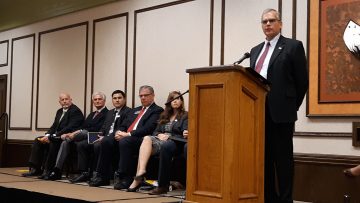
J. Michael Galbraith answers a question.
The next question was about the need for additional tax reform.
Kissick said more reform is needed at the federal level. “The tax burden is much too high,” he said.
He supports changing to a flat tax, then moving onto a “fair tax” of just using a sales tax. Kissick also talked about the need to reduce diesel fuel taxes.
Latta touted the tax reform passed recently by Congress. He talked about the “900-plus meetings” he has held in the district, when he frequently hears about taxes being too high.
“Hard-working men and women have more money in their pockets” thanks to the tax reform, he said.
And companies are hiring more employees, he said, adding that the cuts need to be made permanent.
Galbraith pointed out that those tax cuts from Congress added another $1 trillion to the national debt.
“The rich and powerful” were given big tax cuts, while the average person was “just thrown peanuts.”
“That tax cut is a scam really,” Galbraith said.
In his closing comments, Latta talked about the “economic revival,” the low unemployment and the tax cuts helping the middle class. He also mentioned the opioid crisis that is “destroying lives, families and careers.”
Kissick talked about the value of the individual, and this region of the nation being the “heart of Midwest manufacturing.”
Galbraith spoke of the threats in Washington, D.C., to the rule of law and democracy. He referred to Latta’s meeting with 900-plus businesses – but asked “what about the people?”
Galbraith said local farmers have shared their concerns about the “unnecessary trade war” and the hardships it is causing them. He talked of retirees feeling under threat, and the middle class being squashed to benefit the rich.
Running for the Ohio House of Representatives 3rd District seat are Republican incumbent Theresa Gavarone, an attorney, business owner and former Bowling Green City Council member; and Democrat Aidan Hubbell-Staeble, a political science major at BGSU and full-time employee at Kroger.
The first question for the House candidates was on the value of the Medicaid expansion in Ohio.
Gavarone said the expansion has helped people suffering from addiction and mental illness. “We need to do a lot more,” she said.
Gavarone added that the state needs to make sure the Medicaid expansion is economically feasible.
Hubbell-Staeble said 650,000 Ohioans now have access to health insurance because of the expansion. He talked about his family’s experience – with his mom being diagnosed with breast cancer when he was younger, and the family having to declare bankruptcy.
“I think that’s wrong. I don’t think anyone should have to do that,” he said.
Hubbell-Staeble said he supports the expansion for health care coverage. “Coverage shouldn’t be determined by how much you make or how much your parents make,” he said.
The next question asked the candidates to state their positions on abortion.
Hubbell-Staeble said he is pro-choice. “As a man, I don’t think it’s my right to tell a women what to do with her body.”
“It’s been decided by the Supreme Court a long time ago,” he said.
Gavarone said she is pro-life. “I believe in the sanctity of life and protecting the vulnerable.” Gavarone added that she also supports resources for women to get care and reduce infant mortality.
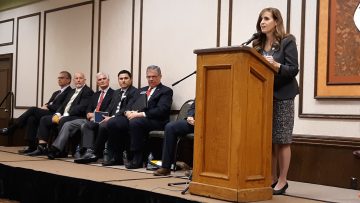
Theresa Gavarone answers forum question.
The third question dealt with collective bargaining in the public sector.
Gavarone said employees should be heard by their employer. But she added, “I’m a strong believer in the free market.”
There is an “intersection” between how much an employer will pay and how much a worker is willing to accept.
As a business owner of Mr. Spot’s with her husband, Gavarone said employers face difficult decisions on issues that can lead to job cuts, price hikes, or even closure of a business.
“We want to grow the job market here in Ohio,” she said.
Hubbell-Staeble said this issue is personal for him.
“The Republicans in Columbus have attacked workers’ rights in Ohio,” with Senate Bill 5 which was defeated, he said.
“These are the people who need public bargaining rights,” he said. Workers need “living wages” without the threat of losing their jobs.
In their closing statements, Hubbell-Staeble said democracy is “under attack.”
“We need to stop pretending like everything is OK in our state and country,” he said. “People are sick and tired of not making enough money, and working all day, every day.”
Hubbell-Staeble admitted he is not the customary candidate. He is not an attorney, and did not grow up wealthy. His parents worked multiple jobs to make ends meet. “That’s wrong,” he said.
Ohioans deserve access to health care, living wages, and access to their elected officials, Hubbell-Staeble said.
Gavarone said with her experience, she is able to “hit the ground running.” As a business owner, she knows how to build jobs. As a former Bowling Green council member, “I understand the struggles of our local government.”
She also talked about her success securing state grants for local projects, such as the new senior center, the Cocoon shelter, BGSU and Owens.
“I’ve got a bipartisan reputation,” Gavarone said.
In the race for Wood County Auditor are incumbent Republican Matthew Oestreich, who has worked in the auditor’s office for 18 years; and Democrat Buddy Ritson, who has a bachelor’s in finance and is working toward his master’s degree.
The first question dealt with data management and its protection in the auditor’s office.
Ritson said the office should be working toward going paperless in some functions, and making the website easier to navigate. The auditor’s website gets about 20,000 hits a week.
Oestreich said the office has been working at streamlining, going from 30 to 18 employees. Since taking over as auditor, he has trimmed it down another 2 ½ employees. Oestreich said the website is very informative, and he said the office takes safeguarding information very seriously.
The next question addressed the top issue for the auditor.
Oestreich said the office fulfills many duties, including being the fiscal officer of the county, doing payroll for the county employees, and handling weights and measures.
“The auditor wears many hats,” he said.
Ritson said the top issue should be to improve taxpayer service.
“We’re one of the highest taxed counties in Ohio,” he said, adding that the auditor should make sure every parcel in the county is appraised properly.
Ritson was critical of the auditor’s office hiring a private company to appraise property values. He suggested that rather than trimming employees, the office should add workers to handle appraisals in-house.
The last question addressed the problem with the collection of school taxes in Perrysburg, with taxpayers initially being charged too much by the office.
Ritson said the auditor’s office has still not identified who has at fault, or how the error occurred. More than $2 million was over-collected. “The auditor’s office still doesn’t know how it happened.”
Oestreich asked for all those in the audience who were overcharged to raise their hands. He apologized to them for the error.
“I take full responsibility for that,” he said. The error was identified, and his office worked with the school board to correct the problem. About 1,600 parcels got refund checks in a matter of a week, he said.
The error occurred in his first month in office, and “I’ve learned a lot from it,” Oestreich said.
In closing statements, Ritson said Wood County is one of the highest taxed counties in Ohio. The auditor should make sure people are taxed properly, “putting money back in your pockets,” he said.
Oestreich promised to continue working hard for the county and being available to constituents.
He also added that taxes are set by market values. “The auditor does not increase your taxes.”
Running for the 6th District Court of Appeals is Democrat Joel Kuhlman, who has engineering and law degrees, is a practicing attorney, and served as a Wood County commissioner, Bowling Green council member, and Wood County school board member; and Republican Gene Zmuda, who has been a trial judge for 15 years, and has worked as an adjunct law professor.
The first question dealt with judicial temperament.
Zmuda said judges must be fair and open-minded. They must approach a case with a “blank slate” and cannot pre-judge, he said. Despite society’s desire for immediate reactions, a judge must take time to review.
Kuhlman agreed judges must be objective, and listen to all the facts before making decisions. As someone dealing with clients on a regular basis, Kuhlman said he understands the need for a calm temperament.
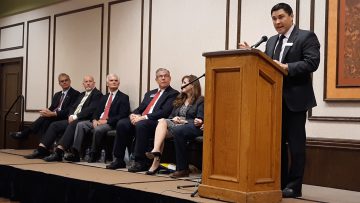
Joel Kuhlman speaks a candidate forum.
The second question asked for definitions of judicial independence.
Kuhlman talked about the need for independence from the executive and legislative branches. That separation should also be extended now to media and social media.
By being elected as judge, “you at least have to have your finger on the pulse of the community,” Kuhlman said.
Zmuda said the third branch of the government connects the other two branches through its decisions. “We have words” based on rules, not personalities that provide that connection.
“Remember, Lady Justice is blind,” Zmuda said.
And the last question was on the responsibility of the Court of Appeals.
Zmuda said the court reviews the trial courts’ work, like the instant replay booth at NFL games.
Kuhlman added that the appeals court looks at the objectivity and consistency of the lower courts.
In wrapping up, Zmuda said he believes in “grassroots democracy” and has never taken votes for granted. He spoke of his range of court experience from minor issues to death penalty cases.
Kuhlman talked about his experience in local government.
“You know what you can expect from my services – dedication and hard work,” he said.
Kuhlman also talked about being horrified to hear a judge refer to statistical data as “gobbledygook.” He said he has respect for and the ability to understand statistical data.

